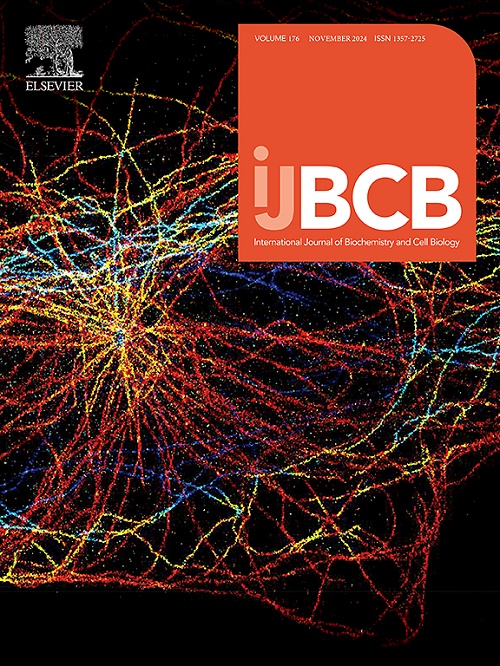Syndecan-2 positively regulates Wnt/β-catenin signaling in breast cancer cells
IF 2.8
3区 生物学
Q2 BIOCHEMISTRY & MOLECULAR BIOLOGY
International Journal of Biochemistry & Cell Biology
Pub Date : 2025-08-25
DOI:10.1016/j.biocel.2025.106853
引用次数: 0
Abstract
Syndecans are a family of four-member transmembrane heparan sulfate proteoglycans that bind to various extracellular biomolecules, such as Wnt ligands, via their heparan sulfate chains, thereby controlling a variety of cellular processes. When dysregulated, syndecans can affect tumorigenesis and cancer progression by modulating key signaling pathways involved in the regulation of biological functions. Aberrant activation of Wnt/β-catenin signaling is a hallmark of many human tumors, including breast cancer. Studying the interplay between syndecans and Wnt signaling in human cancers is beneficial for identifying new therapeutic strategies, understanding tumor behavior and improving patient outcomes. Syndecan-2 is predominantly expressed by mesenchymal cells, and its overexpression in tumors of epithelial origin appears to induce aggressive behavior. Here, by measuring β-catenin cytoplasmic stabilization and transcriptional activity, we show that syndecan-2 expression significantly enhances the sensitivity of HEK293T cells and BT-20 triple-negative breast cancer cells to Wnt3a-induced activation of Wnt/β-catenin signaling. In addition, CRISPR/Cas9-mediated deletion of SDC2, the gene encoding syndecan-2, reduced β-catenin transcriptional activity in BT-20 cells in response to Wnt3a stimulation. This reduction was rescued by the re-expression of SDC2. Collectively, our results demonstrate that syndecan-2 is a positive regulator of canonical Wnt signaling. These results also suggest that syndecan-2 is a potential clinical target for inhibiting the progression of some human cancers.
Syndecan-2正调控乳腺癌细胞中Wnt/β-catenin信号
Syndecans是一个四成员的跨膜硫酸肝素蛋白聚糖家族,通过其硫酸肝素链与各种细胞外生物分子(如Wnt配体)结合,从而控制多种细胞过程。当失调时,syndecans可以通过调节参与生物功能调节的关键信号通路来影响肿瘤发生和癌症进展。Wnt/β-连环蛋白信号的异常激活是包括乳腺癌在内的许多人类肿瘤的标志。研究人类癌症中syndecans和Wnt信号之间的相互作用有助于确定新的治疗策略,了解肿瘤行为和改善患者预后。Syndecan-2主要由间充质细胞表达,其在上皮源性肿瘤中的过度表达似乎会诱导侵袭性行为。本文通过测量β-catenin细胞质稳定性和转录活性,我们发现syndecan-2的表达显著增强了HEK293T细胞和BT-20三阴性乳腺癌细胞对wnt3a诱导的Wnt/β-catenin信号激活的敏感性。此外,CRISPR/ cas9介导的SDC2(编码syndecan-2的基因)的缺失,在Wnt3a刺激下降低了BT-20细胞中β-catenin的转录活性。SDC2的重新表达挽救了这种减少。总之,我们的研究结果表明syndecan-2是典型Wnt信号的正调节因子。这些结果还表明syndecan-2是抑制某些人类癌症进展的潜在临床靶点。
本文章由计算机程序翻译,如有差异,请以英文原文为准。
求助全文
约1分钟内获得全文
求助全文
来源期刊
CiteScore
8.10
自引率
0.00%
发文量
124
审稿时长
19 days
期刊介绍:
IJBCB publishes original research articles, invited reviews and in-focus articles in all areas of cell and molecular biology and biomedical research.
Topics of interest include, but are not limited to:
-Mechanistic studies of cells, cell organelles, sub-cellular molecular pathways and metabolism
-Novel insights into disease pathogenesis
-Nanotechnology with implication to biological and medical processes
-Genomics and bioinformatics

 求助内容:
求助内容: 应助结果提醒方式:
应助结果提醒方式:


